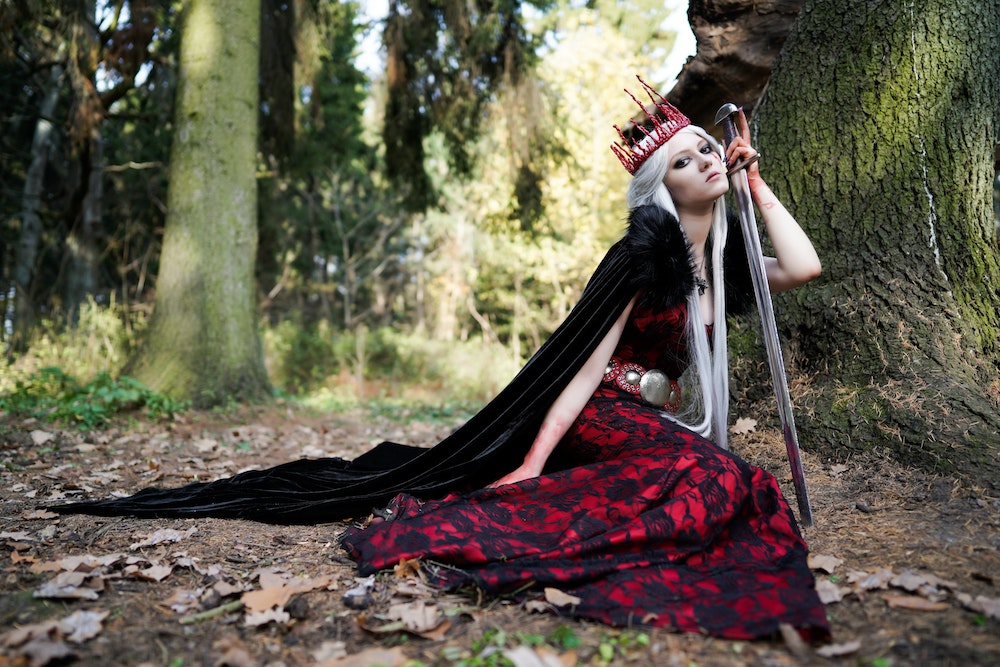Interviews
Stop Telling Women to Tone It Down
Rachel Vorona Cote's "Too Much" is a manifesto for women who are sick of making themselves small

There’s this great moment in The Morning Show where journalist Bradley Jackson, played by Reese Witherspoon, launches into a monologue of frustrations:
“I’ve only been told in about a thousand different ways [that] I’m too liberal, too conservative, too in-between, [have] too much chin, not smiling enough, too brunette (do you wanna go blonde?), where are your boobs, put your boobs out, put your boobs away, you’re attracting men, you’re scaring women…I’m tired. And I don’t feel like pretending.”
There’s a truth in here that many of us will recognize: As women, no matter what choices we make, we are always, in some avenue, perceived as too much.
But Rachel Vorona Cote reassuringly writes, “The roots of rules are never so deep that they cannot be wrenched from the soil.” In her debut nonfiction book Too Much: How Victorian Constraints Still Bind Women Today, Vorona Cote develops a sharp, expansive argument around the too-muchness of women: a label and fear that shapes many of our experiences today. From the way we speak to the sex we want, from the rage we feel to the friends we keep, Vorona Cote contends that most of us will, “at some moment…be marked as a Too Much woman.”
But this isn’t necessarily a bad thing. In fact, it’s in our too-muchness that we can uncover room to breathe, to grow, and finally, to feel. “Permission,” Vorona Cote writes, “is irrelevant to the matter; it’s merely a fiction born from power. There is always space, and it ought to be claimed.”
Early into The Morning Show, Bradley storms out of her TV reporting job, snapping at her employer: “Find somebody else to be invisible for you—to deal with the world’s heartaches and not have any fucking feelings about it.”
Indeed, find someone else. We, over here, are simply too much.
I spoke to Rachel Vorona Cote about illness, self-harm, Britney Spears, imperialism, and why friendship between women defies taxonomies of control.
Richa Kaul Padte: The Victorian era, you write, was “a historical period when women’s too muchness underwent vigorous medical scrutiny,” often arriving at the catchall diagnosis “hysteria.” Centering on the idea that women’s emotions—born from their wombs—were almost always in excess, an 1847 medical text stated: “the symptoms of this disease comprise…those of nearly every other disease under the sun.” How, um, convenient.
As someone who lives with chronic illness, I’ve had so many doctors tell me that my emotions are the root cause of my symptoms, from migraines to dizziness to debilitating fatigue. You write: “women’s bodies…are not trusted to register maladies in ways legible to the institution of medicine—and we, the custodians, cannot be trusted to accurately represent our interiorities.” Why, according to you, does this absurd 19th-century diagnosis still persist today?
Rachel Vorona Cote: First of all, I’m so sorry about the experiences you’ve had. That’s just wretched!
Patriarchy thrives because our most influential institutions unite in structural efforts to divest women of autonomy.
I think people become very attached to explanatory narratives, especially when those narratives are fundamental in shoring up their power—and, crucially, withholding power from others. After all, dominant histories and ideologies prevail because they benefit those perpetuating them. So while I don’t believe that doctors are explicitly diagnosing women as hysterical today (god, I hope not), the enduring refusal to take us seriously as patients, to assume that our symptoms are illusory or are the byproduct of runaway emotions, makes a depressing kind of sense to me. Patriarchy thrives because our mightiest and most influential institutions, including medicine, unite in structural efforts to divest women of autonomy. This is even more the case for women of color, queer women, and for the trans and nonbinary communities. Too often, we’re not regarded as reliable narrators, particularly when we’re talking about our bodies, and how it feels to live inside them. Of course this is an absurd mythology; it was absurd in the 19th century, too. But powerful men profit from a system that does not prioritize us, and so for them, the notion of the hysterical woman is a necessary myth.
RKP: When I was a teenager, I was often told that I got “irrationally” upset if something negative was said about my friends—a state of affairs that my mum, who often had critical things to say, continues to remind about me today. But I know deep down it’s true. I still feel wildly protective over my friends in a way that I never have over a romantic or sexual partner, and that I doubt I ever will. However, the unspoken messaging from the world is that this is a weird territory to so aggressively defend; an overreaction to relationships that are not supposed to count for that much.
You reassuringly state: “platonic romance is as vast and boundless as anything sexual.” Why are we collectively so hell-bent on dismissing this truth?
RVC: I’m so glad to be reassuring on this point! It’s a gospel I embrace. But we humans do love our taxonomies, and I think that urge to classify and draw boundaries, to say “this or that,” is born from a fundamental anxiety of control. We like to know how to identify things; it feels reassuring, as if by naming a phenomena, or in this case, an interpersonal relationship, we immediately exercise authority over it. And of course, there is power in classification—we wield authority by assigning names to communities and countries and supposed illnesses like hysteria. When we are little, we name our toys not only as a sign of affection, but also to lay claim.
Historically, women have shouldered a heavy burden of over-signification, and this is an issue of power. I don’t want to seem like a Foucault acolyte, but I do think we attain power through knowledge, or at least perceived knowledge, and therefore we feel more dominant when we believe we understand something. Friendship between women is not supposed to threaten heteronormative arrangements. It’s not supposed to challenge what we think we know about romantic love or sex, and specifically the way women love and have sex. When we say two women are friends, we want to rest easy on the assumption that the friendship matches a certain template: one that has been naturalized over centuries and ultimately codified as “normal.” There is simply no correct way for two people to love each other—apart from being compassionate and emotionally generous—and to my mind, this is a gorgeous quality of human life. How great it would be if people could simply accept this and remember that another person’s relationship, whatever its manifestation, doesn’t concern them? But all-consuming intimacies between women do not seem to leave room for men, so they will always seem transgressive, even dangerous.
RKP: When I was an art student in high school, I had a beautiful craft knife. It came in a blue plastic casing with pastel illustrations, and had a long, segmented blade: when it lost its sharpness, you could snap off the topmost part and move to the next one. I can’t remember whether it was the first knife I ever used cut myself, but I know it’s the one I used going forward: so innocent and pretty, tucked safely into my pencil case.
One of the (many!) things I love about Too Much is the way you position cutting—including its antecedents in the Victorian “Needle Girls” phenomenon—against various “socially sanctioned forms of self harm,” from corsets to diet pills. You write: “we have always been encouraged to wreak havoc upon ourselves, so long as it is in the interests of male desire.” Where, in this context, do my blue craft knife and your purple scissors fit? Are they acts of self-sabotage, or bids for agency and control?
RVC: Oh, I wish I could hug you right now! It’s so hard to live in the world sometimes, rubbing up against all those jagged edges (hmm, a complicated metaphor for this topic).
Powerful men profit from a system that does not prioritize women.
I could never presume to tell you what your experience with self-harm means. I will only say that I hope you are safe, ensconced in the tender care you deserve. As for my purple scissors, and my own tangled relationship with cutting—it has always been imbued by a yearning for agency and control. And to the extent that I have inflicted wounds upon myself and indulged a malicious personal narrative, yes, it is destructive. When I feel shame about a particular behavior or feeling, I’m often motivated to intellectualize it, and this is probably a partial motivation for writing about self-harm. It’s a little like taking myself to trial and demanding testimony of myself. It’s also, surprise, another means of exerting self-command.
That’s the peculiar thing about self-injury: it’s simultaneously a loss of and a desperate grasp for control. I engage in it when my most miserable feelings have overwhelmed me, which catalyses the urge to render them legible, something I can examine and trace with my finger. In the moment, I can pretend that I’m managing and reorienting my pain, although I am only acting at its behest. Because even if cutting can serve as a pressure valve of sorts, it merely supplies me with the illusion of control: I only ever emerge from these episodes embarrassed, not to mention frustrated and dejected (though, to be clear, nobody should be embarrassed because they live with mental illness). I’ve been fortunate to have access to excellent therapy and effective medication, and both these tools have aided me in finding other ways to grapple with my unwieldy brain.
RKP: Please let’s talk about Britney Spears (who, for the record, I will ride and die with for all my days!). There’s a popular meme of the pop star from a famously challenging period in 2007: it in, she sports a shaved head, grey hoodie and slightly bared teeth. The block-capital white text reads: “If Britney can make it though 2007, you can make it through today.” My best friend and I have strong feelings about this: if it’s shared between “true fans,” the meme can be an act of genuine encouragement—we know how the media hounds her, the legal conservatorship she’s trapped in, and the fact that she is still not allowed to drive a car or own a smartphone. When anyone else shares the meme, though, we perceive it as what you accurately term “pageantry.”
You write: “A woman whose too muchness trickles into the realm of mental health is never granted the pen to her own story.” Is the difference between pageantry and empathy an awareness of someone’s context? And can we ever #FreeBritney without allowing her the space to narrate her own?
RVC: So much about Britney Spears’ story—or at least what we believe her story to be—is equal parts absorbing and sad. There is no way to know how fully her public image has been manipulated—by her PR people, the tabloids, etc. And that’s okay, because we’re not entitled to her, something she seems to have tried to express here and there.
I like the distinction you’re drawing between pageantry and empathy, and yes, I do think that a sensitive consideration of context makes the difference, together with intent. If you and a friend share the Britney meme to remind each other that shitty circumstances can be overcome, that’s very different from printing the meme on a t-shirt and making it joke fodder. We have to think carefully about the images we circulate of women, even famous women like Spears who benefit financially from public exposure. Because, inevitably, those images tell us something about our inclinations, desires and the sorts of assumptions we make about people—especially when they broadcast the sort of vulnerability so apparent in the Britney meme. I hope that she can escape that terrible conservatorship and that she’ll one day be able to speak more freely, if she wants to, and on her own terms. Beyond that, I’m not sure what freedom would look like for her versus somebody who is not rich and famous—and who, accordingly, is not exploitable in the same ways but also does not have access to her privileges.
RKP: There’s this moment in the book where you’re laughing and chatting with a group of people, until one of them snaps at you: “Rachel, you’re SO LOUD!” This story really struck me, because it recalled a pivotal moment in the trajectory of my own self-modulation. I had recently moved to the U.K. and was in the company of my new friends, talking enthusiastically about something. And suddenly, one of the girls turned to me and said: “Richa, the way you talk sometimes really frightens me.” I immediately felt so ashamed, even though I didn’t know exactly why. But after living in a predominantly white area for many years, I realized that almost everyone who was deemed “scary” when they spoke was a person of color. If “seizing the tatters of respect and tolerance has always meant whittling ourselves into shapes that are…easiest to swallow,” is the burden on some women greater than others?
RVC: I’m really sorry that happened to you, Richa! It’s mortifying to be called out in that way, and to be told that something about you is frightening, especially in public—how accusatory and maliciously shaming. It is absolutely the case that the burden of whittling ourselves down is by no means evenly distributed among women. Whatever my experiences have been, I am white, cisgender, and although I’m bisexual, I pass as straight. I cannot possibly know the trauma that results from being policed when you are a woman of color, a transwoman, a feminine-presenting non-binary person, or someone who is otherwise gender non-conforming. If sharing my experiences is clarifying and comforting, then I am both grateful and glad. But I’m keenly aware that as a deeply privileged white woman, my most important work will always demand rigorous de-centering. Whatever is difficult for me about living in the world is exponentially more complicated and harrowing for so many other women. And practicing empathy means always keeping that in mind, and doing what I can to make our shared environments more tender and, above all, fully inclusive.
RKP: British Imperialism was at its height during the Victorian era; as a result, many countries are still navigating legacies left behind by their ex-colonial rulers. In India, where I live, Victorian beliefs are perhaps at their most insidious in the realm of sexuality. To date, British obscenity legislation governs all sexual representations in India—though in practice, these laws are only used to curb sexual content pertaining to women. Similarly, in the Victorian period, it wasn’t that there was no sex-talk; there were just very strict rules around “who had the authority to speak about it…[and] how that information was dispersed.”
Rachel, Too Much is such a wonderful invitation for people who have been historically excluded from certain narratives to speak; to understand how we have been shaped by what came before us, but that we need not be bound by it. Was this, partly, your intention for readers—or simply my personal takeaway?
RVC: No pressure, Richa, but I am enthusiastically here for your book on sexuality and British Imperialism. Please let me know when I can preorder it.
I am humbled that you received Too Much in this tremendously generous way. It’s not for me to extend any invitations, but I do hope that my book will encourage a thorough conversation, one enriched by many voices who can speak to history and experiences of which I am totally ignorant. That said, I also think via writing: it’s my preferred and most trusted mode of figuring things out and determining where I land on a chosen subject. So while I did write this book in part to sketch out a cultural history, it was also a selfish undertaking: I needed to explain this history to myself. For that matter, I needed to explain me to myself.
But as I say at the start of the book, this project is inherently limited: I’ve told one story based on my research, personal history and understanding, but it’s by no means definitive. This is something I have to remind myself because I cling so tenaciously to narratives. I’m always referencing them because of my own anxieties about the unknown and unpredictable. I scout out every possibility for lucidity, searching for a broad, bright web of cause and effect. If I were a narrator in a novel, I’d want to be third person omniscient so that I could bear witness the full scope of the story. But Too Much, despite the title, was never going to be the full scope, only a slim pathway. I hope that other paths will wind around to meet it, and maybe even sprout from it.









